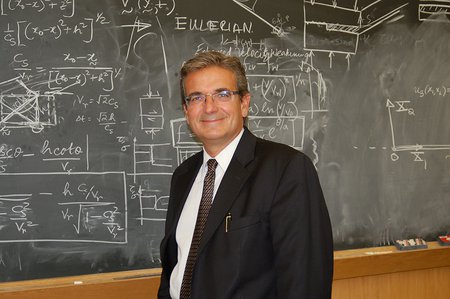Ares Rosakis, the Theodore von Kármán Professor of Aeronautics and Mechanical Engineering in the Division of Engineering and Applied Science, will receive the Theodore von Kármán Medal from the American Society of Civil Engineers. The medal was established and endowed in 1960 by the Engineering Mechanics Division of the society—now the Engineering Mechanics Institute (EMI)—in order to recognize distinguished achievement in engineering mechanics. The Von Kármán medal is the flagship medal of the EMI.
Rosakis is being honored for "discovering several fundamental physical phenomena in dynamic fracture of heterogeneous materials and interfaces at various length and time scales," according to the award citation. Particularly noted was his proposal of the concept of "laboratory earthquakes" and the associated unique experimental facility, which was established at the Graduate Aerospace Laboratories of the California Institute of Technology (GALCIT) more than a decade ago. Through experiments that reproduce the basic physics of earthquake rupture, he and his collaborators, including Caltech seismologist Hiroo Kanamori, were able to experimentally show that earthquake ruptures may propagate with "super-shear speeds"—speeds in excess of the bulk shear wave speeds of the surrounding material. They also conclusively proved that certain historic, large earthquakes did transition to super-shear and explained the unusual ground-shaking signatures that are characteristic of such catastrophic events.
"I feel extremely honored and humbled to receive the Theodore von Kármán Medal from the American Society of Civil Engineers," says Rosakis. "I am especially thrilled to receive an award bearing the name of von Kármán, whose remarkable achievements epitomize Caltech's natural interdisciplinary approach to science and engineering."
Rosakis has also served as the fifth director of GALCIT, which was established and directed by Theodore von Kármán in the early 1920s.
 Ares Rosakis
Credit: EAS Office of Communications/Caltech
Ares Rosakis
Credit: EAS Office of Communications/Caltech

